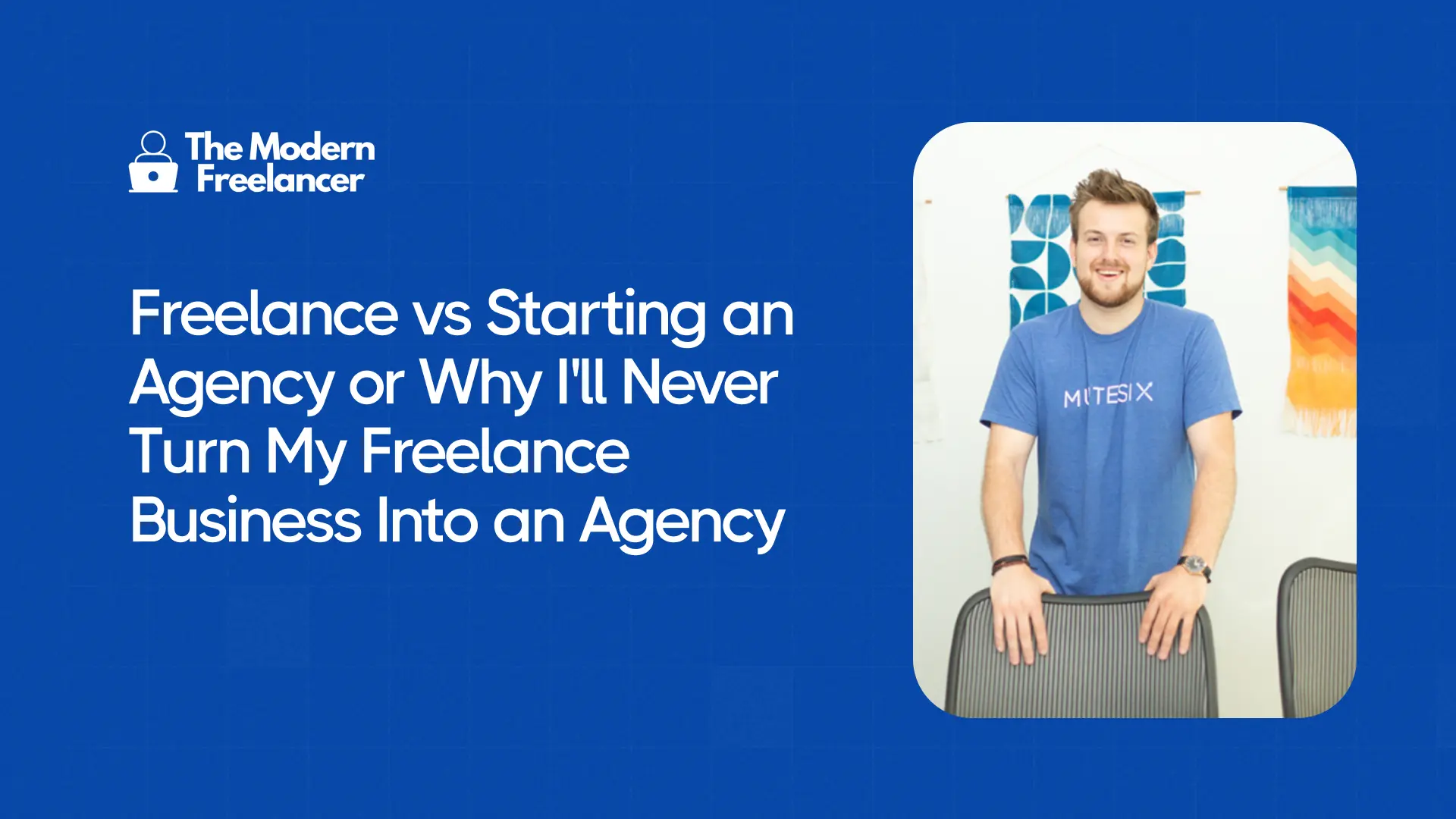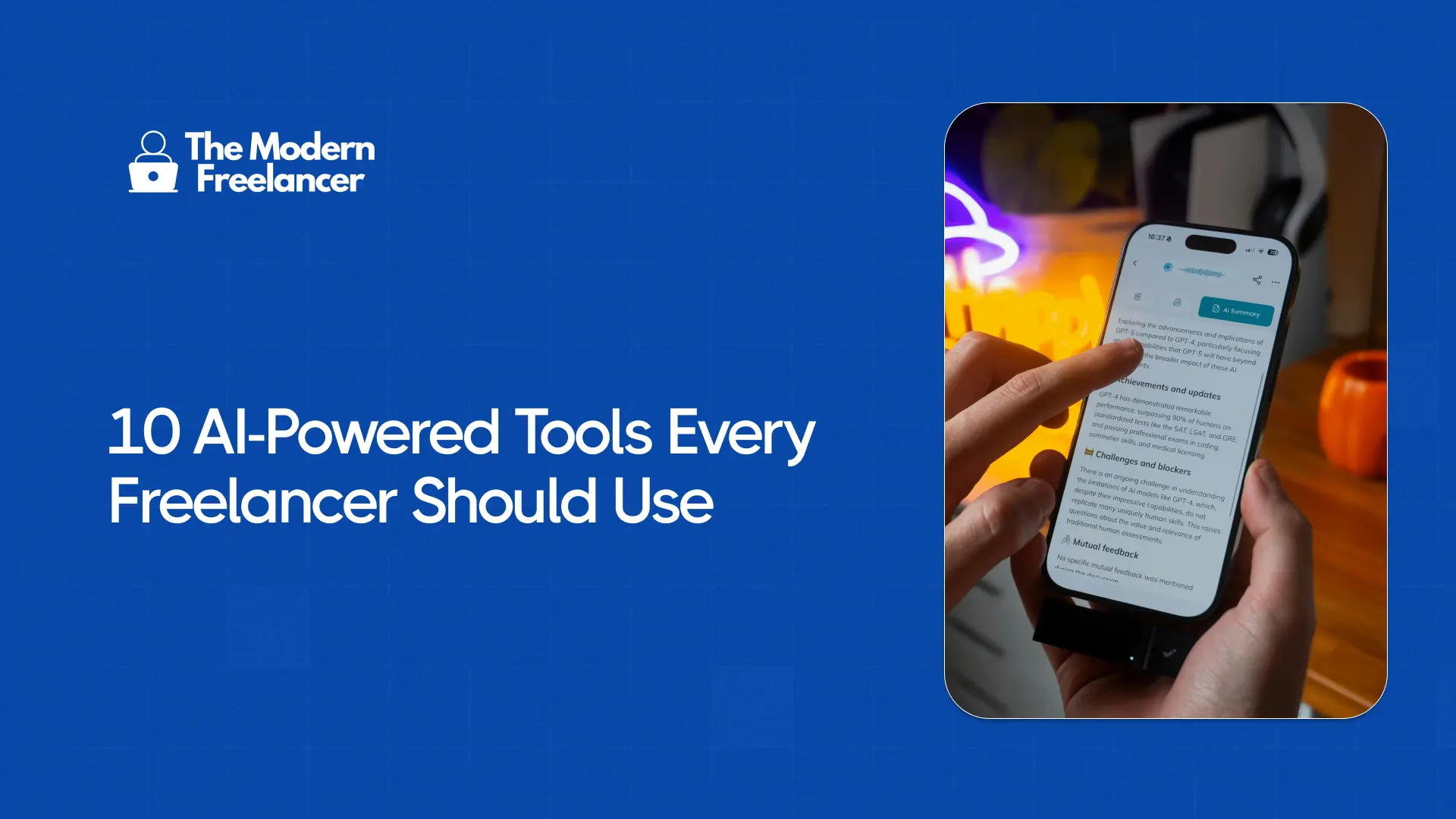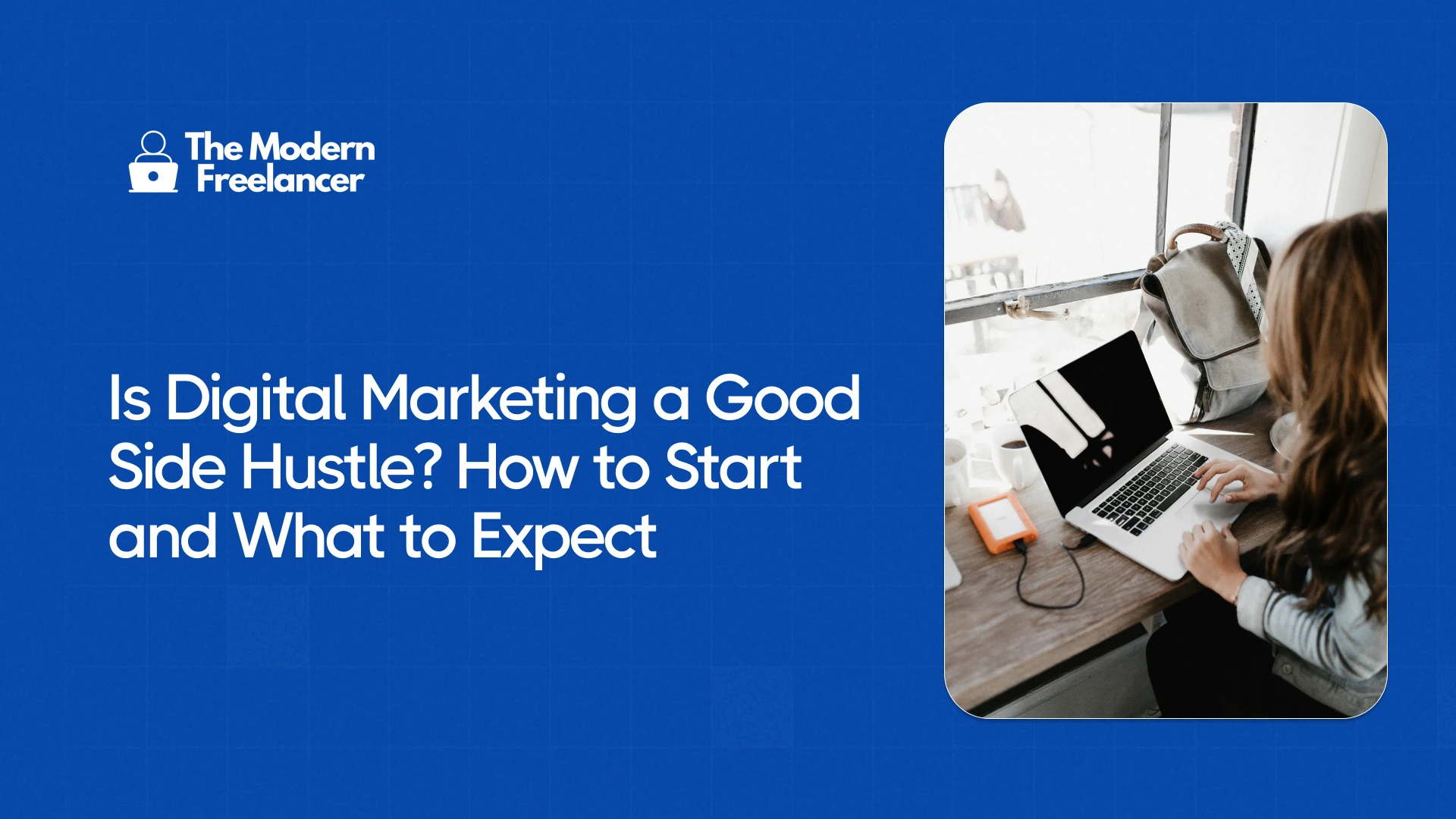Freelance vs Starting an Agency or Why I'll Never Turn My Freelance Business Into an Agency
Discover why staying solo beats building a freelance digital marketing agency. Learn about freedom, scaling smart, and real success in freelancing.

Heads up: Some of the links below are affiliate links, which means I may earn a small commission if you choose to use them — at no extra cost to you. I only recommend tools I personally use and trust.
"Why don’t you build an agency?"
I get asked this question at least once a month. Usually from other freelancers who see how many leads I get and assume that scaling to an agency is the natural next step for any successful solo consultant.
Here's my answer: Never.
And I'm not saying that to be contrarian. I'm saying it because I've seen what actually happens when you scale from the inside.
When we scaled Mutesix from 25 employees to 500 in just 3 years, I watched my day-to-day change drastically.
I went from being a marketer in the trenches - building Facebook ad campaigns, analyzing data, optimizing creative - to managing 15 people. And while I loved my team and genuinely enjoyed working with them, I missed the actual marketing work.
Instead of spending my days coming up with marketing strategies and solving client problems, I was in back-to-back meetings about team performance, dealing with HR issues, and filling out paperwork I never knew existed.
(If you’ve ever had to put someone on a PIP, you know what I’m talking about.)
That experience taught me something crucial: bigger isn't always better. Sometimes it's just more complicated.
Understanding Freelance Digital Marketing Agencies and Freelancing
You'd be surprised how many freelancers talk about building agencies without actually understanding how to scale and how the business model works. So before you chase the “agency dream,” let’s break down how these two worlds really function.
Most people see the fancy brand name, the team photos on LinkedIn, the idea of passive income rolling in while other people do the work. But nobody talks about the other stuff: operations, systems, payroll cycles, hiring/firing, financial risk, and the fact that your clients now rely on your ability to manage humans… not run ads.
Many agencies aren’t even profitable. They collect big retainers but spend 60–80% of revenue on salaries, tools, office space, and churn. A solo freelancer charging $10K/month with zero overhead often takes home more profit than a “$100K/month agency founder” bragging on Twitter.
So the question to ask yourself isn’t “Should I build an agency?”
The real question is: “Do I want to spend my days doing marketing… or managing people?”
Two very different games. Two very different skill sets. Two very different lifestyles.
How Freelance Digital Marketing Agency Works
A freelance digital marketing agency is basically the halfway point between being a solo operator and running a full-blown corporate agency.
Instead of one person doing the work, the “agency” sells services and uses contractors or employees to deliver the work. It sounds simple, but it shifts everything about how you operate:
- You stop doing most of the technical work
- Your main job becomes sales, management, delegation
- You rely on other people to maintain quality
- Your income depends on your ability to manage, not market
Some people love this. They want a team, processes, systems, and scale. But many freelancers don’t realize how fast it becomes a people-management business instead of a marketing business.
How Freelancing Works
Freelancing is the opposite. You sell your own expertise, you do the work, and you keep the profit. If you run a freelance digital marketing business, you're the strategist, the problem-solver, the closer, and the person clients trust.
Freelancers get into this because they want freedom. The ability to work from anywhere, choose clients, control income, and avoid corporate nonsense. And freelancing gives you that if you keep it simple.
The Pressure to Scale
Every successful freelancer faces this pressure. Hit six figures? Time to hire. Hit multiple six figures? You need an agency.
Society has conditioned us to believe that growth equals success. That staying small means you're not ambitious enough. That if you're not scaling, you're not winning.
But here's what nobody tells you: The skills that make you a great freelancer are completely different from the skills that make you a great agency owner.
Being good at ads or copywriting doesn’t make you good at managing people or HR policies. And if you built your career around freelance to freedom, that shift might cost you everything you actually love about the work.
What Actually Happens When You Scale
At Mutesix, I had a front-row seat to the reality of agency growth:
The work changes: Instead of doing marketing, you're managing marketers. Instead of solving client problems, you're solving people problems.
The fires multiply: With 25 employees, we had client issues. With 500 employees, we had client issues AND employee issues AND operational issues AND legal issues.
The freedom disappears: Remember those micro-moments that make freelancing worth it? Gone. You can't just decide to leave the office at 3 PM when 15 people who work for you stay until 6 PM.
The relationships get diluted: As a freelancer, you work directly with clients. As an agency owner, you're three layers removed from the actual work.
The stress compounds: It's not just your business anymore - it's 15 people's livelihoods. That weight hits different.
The Hidden Costs Nobody Talks About
Beyond the obvious expenses (salaries, benefits, office space), scaling comes with hidden costs:
- Recruitment and training: Constantly hiring and onboarding new people
- Management overhead: Your time becomes consumed by people management
- Quality control: Maintaining standards across a large team is exponentially harder
- Client retention: Bigger teams often mean less personalized service
- Legal and compliance: More employees = more regulations and potential lawsuits
Most importantly: You lose the thing that made you start freelancing in the first place - control over your time and work.
The Solo Freelancer Advantage
Here's what I can do as a solo freelancer that agency owners can't:
- Work from Dubai at 2 PM (like I'm doing right now)
- Say no to projects that don't excite me without worrying about keeping a team busy
- Keep 100% of the profits instead of splitting them with employees and overhead
- Maintain direct relationships with clients instead of managing account managers
- Pivot quickly without needing team buy-in or retraining
Remember my golden handcuffs story? That $40K/month client was making my life miserable. As a solo freelancer, I could fire him. As an agency owner with payroll to meet, I might have been stuck.
Starting an Agency vs. Freelancing
This is where the fantasy usually collapses. Everyone loves the idea of passive income, employees, and scaling, but they ignore what comes with it. And if you actually weigh a digital marketing agency vs freelance consultant lifestyle, the difference is massive.
- Freelancer: you control your time, your clients, your workload, and your income
- Agency owner: you control none of that, your team does
When you start an agency, you inherit overhead, people management, payroll stress, operations, legal, HR, systems, and a giant list of responsibilities you never had as a freelancer.
Most agency owners even take home less profit than solo consultants, making $20K-$40K/month with no overhead.
The Smart Way to Scale (Without Losing Your Soul)
Now, I'm not saying you should never get help. There's a difference between getting support and building an empire.
Smart scaling: Hiring a VA to handle your $10/hour tasks, maybe a part-time designer for overflow work, or a bookkeeper to handle finances.
Dumb scaling: Building a full team, taking on overhead, becoming responsible for other people's livelihoods, and turning yourself into a manager instead of a marketer.
The key question: Does this hire give me more freedom to do the work I love, or does it create more management responsibilities?
A VA who handles your admin work? Smart scaling - frees you up for strategy and client work.
Hiring 3 account managers and 2 designers? You just became an HR department instead of a freelancer.
So, Is It Better to Be a Freelancer?
For 90% of people? Yes.
If you love marketing, want freedom, want time, and want profit without management headaches… freelancing wins every time.
But if your dream is building a machine, hiring teams, building systems, and being a CEO instead of a marketer, then build an agency. Just don’t do it because Instagram told you it’s a success.
Your Action Step
This week, audit your goals honestly:
- Are you considering scaling because you genuinely want to manage people and build systems?
- Or are you scaling because you think that's what "successful" freelancers are supposed to do?
- What does success actually look like for YOU?
If you're still dreaming of freelance freedom, check out how to transition from 9-5 to full-time freelancing - but do it for the right reasons.
The Bottom Line
I watched Mutesix grow from a scrappy 25-person team to a 500-employee machine. It was impressive. It was profitable. And I would do it again because I was so young and learned a ton.
But these days, I'd rather be a multi six-figure freelancer who controls his schedule than a seven-figure agency owner who's trapped by it.
My version of success isn't about how big I can grow. It's about designing a business that gives me the life I actually want.
And at this point in my life, that dream version doesn't include managing 15 people.
--
Want more freelance marketing tips that actually work?
Subscribe to my newsletter and get actionable freelance marketing strategies delivered to your inbox weekly.



